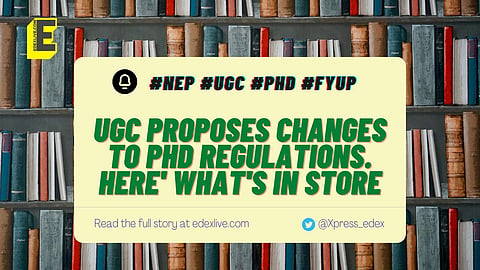

Students who clear their Four Year Undergraduate Programme (FYUP) with a 7.5 CGPA or above may soon be eligible to attempt the exam for a PhD programme in India. This was proposed as part of the University Grant Commission's revised regulations for PhD programmes in the country. The draft regulations were approved by Commission's 556th meeting on March 10 and have now been uploaded on the UGC's website for public feedback, after which they will be brought into effect.
While speaking to Edexlive, UGC Chairman M Jagadesh Kumar said, "The changes are in tune with NEP 2020 recommendations. In the four-year UG programme, students are provided the opportunity to obtain multidisciplinary education. In addition, students can also opt for research training in their fourth year. Under new rules, after the four-year UG degree, students become eligible for admission in PhD programmes if they cross certain CGPA criteria. This is bound to improve the research ecosystem in higher education institutions."
The FYUP, as it is popularly called, is one of the major proposals of the National Education Policy 2020. The qualifying CGPA for candidates from the SC/ST/OBC categories will be relaxed by 0.5%, state the norms. This relaxation has now been extended to the Economically Weaker Sections category as well.
The regulations also propose that 60% of the PhD seats in a particular programme be reserved for those students who qualify the UGC National Eligibility Test (UGC NET) with the Junior Research Fellowship (JRF). These students will be selected based on an interview or viva voce conducted by the institution. The remaining 40% of the seats will be filled up through the university's entrance exam, or the common entrance exam, marks of which will count out of 70. The interview/viva voce will count for 30 marks. This ratio has remained the same as the regulations of 2016.
The revised norms also propose that all fresh PhD entrants across disciplines, be mandated to study credit-based courses in teaching/education/pedagogy/writing related to their chosen PhD subject along with gaining teaching experience during their doctoral training period.
There is also an emphasis on the selection of area of research. The proposed regulations stress 5 aspects of research subjects that will be encouraged. These are social relevance, local need-based, national importance, global significance, and value creation for the society. When asked if fewer students would opt for the Master's programmes now that Postgraduation is no longer a requirement for PhD, the UGC Chairman said that need not necessarily be the case as not everyone may like to do a PhD. There are also no changes proposed to the current eligibility criteria of the JRF/NET exam, he confirms.
